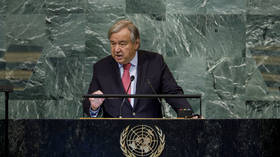Women could ‘turbocharge’ global economy – World Bank

Closing the gender gap could boost global GDP by over 20%, doubling the world’s growth rate over the next decade, according to the World Bank.
Inequality persists across numerous areas, including education, health, work, wages, and labor participation, with women enjoying only two-thirds of the rights of men, a report by the organization has found.
Reforms, however, have “slowed to a crawl” and governments need to speed up progress toward achieving gender equality in workplaces and in their regulatory frameworks, the World Bank stated in its annual Women, Business and the Law report published on Monday.
“Women have the power to turbocharge the sputtering global economy,” said Indermit Gill, the organization’s chief economist.
The global gender gap for women in the workplace is much wider than the previous estimate, and no country provides equal opportunities for women – including the wealthiest economies – researchers concluded after analyzing legal reforms and their actual implementation in 190 nations.
The Washington-based organization revealed that women enjoy less than two-thirds the rights of men when it comes to legal protection from violence and access to childcare. It is estimated that women on average have only 64% of the legal protections that men do, sharply down from the previous figure of 77%.
According to the World Bank, women have a third of the necessary legal protection against domestic violence, sexual harassment, early marriage, and femicide. Although 151 countries legally prohibit sexual harassment at work, only 39 states have laws banning it in public spaces.
The study showed that 98 countries have enacted legislation mandating equal pay for women, while only 35 economies use transparent payment schemes for women.
The World Bank noted that discriminatory laws and practices around the world prevent women from working or starting businesses on an equal footing with men.
“Today, barely half of women participate in the global workforce, compared with nearly three out of every four men. This is not just unfair – it’s wasteful,” said Tea Trumbic, the report’s lead author.
The development organization argues that the transition to a gender-equal world could be fast-tracked through accelerating efforts in reforming laws and enacting public policies that empower women to work, as well as to start and grow businesses.













